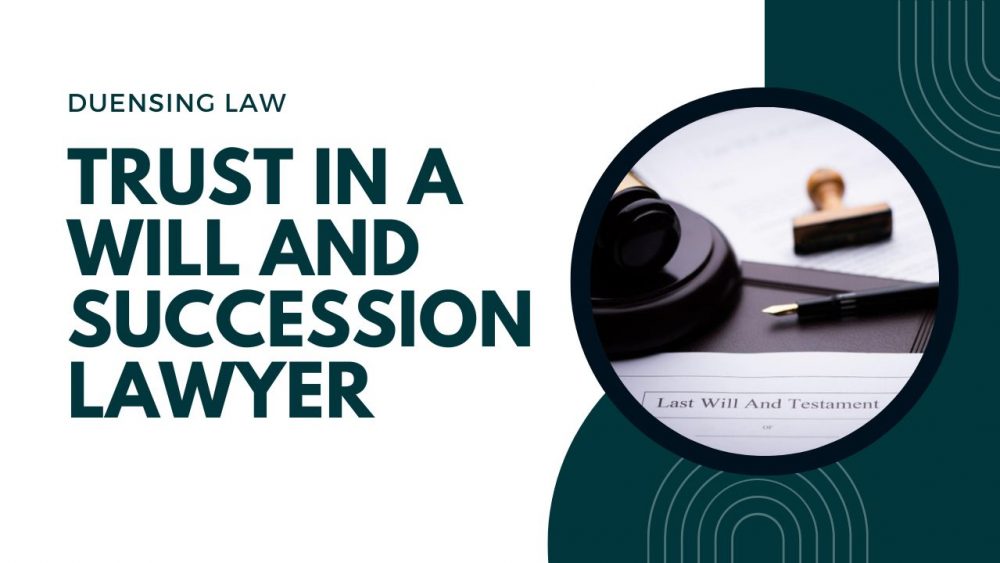A majority of Canadian adults, specifically 56%, do not possess a will and at Duensing Law we urge you to avoid falling under that statistic. Without a will, you forfeit control over the distribution of your assets upon your passing, leading to financial and emotional costs for your loved ones. The administration of your estate may be delayed for several months while a court appoints an administrator which can disturb the lives of all involved. To ensure that your wishes are respected and your loved ones are protected, it is important to have a well-drafted will. At Duensing Law our wills and succession lawyer in Toronto can secure your future and prevent any complications.
While you always have the option to do-it-yourself, to replace the expertise of a qualified professional is unlikely. Wills form the foundation of your estate and tax planning, and errors or omissions can cause costly delays and complications for your executors and beneficiaries. In extreme cases, they may even invalidate the entire will. Given the potential consequences, it is not worth the risk of overpaying taxes and causing unnecessary trouble for your loved ones.
Having a completed will is not always enough since proper signing and witnessing are also crucial. In the event that your witnesses pass away or cannot be located, and no Affidavits of Execution are available, your will may be rejected. This can lead to family disputes and expensive litigation, with legal fees often paid from your estate before any beneficiaries receive their share. This can be avoided by enlisting our services as your wills lawyer. We will use the appropriate language to accurately and precisely convey your wishes in the will. We will ensure that your will is tailored to your specific circumstances and needs. With a qualified, licensed, and insured legal professional protecting your interests, you can have peace of mind.
Powers of Attorney
In Ontario, powers of attorney allow for trusted loved ones or advisors to make health care and financial decisions on behalf of a person who is unable to make those decisions themselves. The power of attorney for property can be exercised at any time, but is typically used to administer a person’s affairs during periods of incapacity. It can also be used to manage affairs while the person is unavailable, such as during travel. The Power of Attorney for Personal Care, on the other hand, empowers the designated person to make decisions about medical treatment and care when the person is unable to do so themselves due to incapacity.
Without powers of attorney in place, a court may appoint a guardian for property or personal care, leaving the individual with no say in the decision. Having powers of attorney in place clarifies the individual’s preferences for a substitute decision maker. If family or friends are not available to act as guardians, the government may appoint the Ontario Public Guardian and Trustee to make decisions. Avoiding this situation is possible by executing powers of attorney.
Why You Should Have A Valid Will
As a single parent, establishing an estate plan is particularly crucial. Without one, the courts will make decisions about the guardianship of your children based on the law, not on your preference, values, or relationships. This means that someone who you may not have chosen to care for your children could be appointed as their guardian. Not having a will can also lead to other important decisions being made by a probate court judge. For instance, the judge may determine who will manage your financial affairs, inherit your money, care for your pets, and make decisions regarding your medical treatment.
When someone passes away without a will, they are said to have died “intestate.” The rules for intestacy and intestate heir laws vary by state and dictate who is eligible to inherit the deceased’s assets. Without a will, the probate court will distribute your assets based on these laws, which may not align with your wishes. In order to ensure that your wishes are respected and your children are cared for according to your preferences, it is important to establish an estate plan. This can include a will, trusts, and powers of attorney that specify who will care for your children, how your assets will be distributed, and who will make decisions on your behalf if you become incapacitated. With an estate plan in place, you can have peace of mind knowing that your wishes will be honored and your loved ones will be protected.
What Happens If You Do Not Have A Will?
If you pass away without a will, your estate will go through a court process called probate. Basu notes that probate can be a lengthy, expensive, and time-consuming process. In this scenario, the probate court appoints an administrator or representative to manage your financial affairs after your death, and you have no say in who is appointed. The administrator will collect your assets, pay your debts and expenses, and distribute your remaining estate to your beneficiaries according to state law, which is supervised by the probate court. The end result is that the court-appointed beneficiaries will inherit your assets, not those named by you. This means that your property could go to a family member whom you don’t want to receive it, instead of a non-relative whom you intended to inherit your assets.
Looking for reliable assistance in matters of Wills and Succession Planning? Give us a call at 416-601-4769! Our team of legal experts at Duensing Law is dedicated to providing exceptional service and guidance in a variety of legal areas. With years of experience and a commitment to our clients, we are confident in our ability to help you navigate the legal system with ease.



Comments are closed.